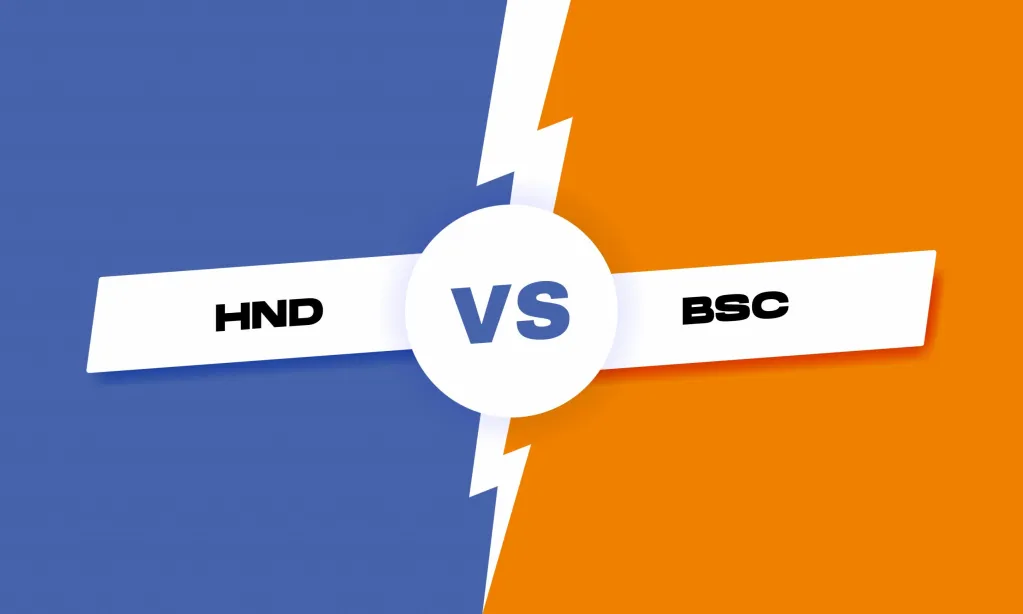The Differences Between BSC, HND, OND, NCE & A’level
You might want to know the differences between BSC, HND, OND, NCE & A’level. These phrases or acronyms are mostly used in the Nigerian educational landscape as awarded degrees to graduates of either Universities or Polytechnics. If you’re a student or recent admissions applicant into any Nigerian school, it is important you know about all of these educational degrees.

It’s crucial to understand them, not just for conversational purposes but also so you can understand what each one truly stands for, what shapes their admissions take, the legal justification for each, and most crucially, so you can decide which one to choose.
BSC, BSC (ED), BSN, B. TECH, MBBS, LLB, B. AGRIC, B. PHARM: WHAT ARE THE DIFFERENCES
Here is a table outlining the main differences between BSC, HND, OND, NCE, and A’level qualifications in Nigeria:
| Qualification | Meaning | Duration | Entry Requirements | Focus |
|---|---|---|---|---|
| BSC | Bachelor of Science | 4-6 years | Secondary school certificate, JAMB UTME | In-depth study in a specific field |
| HND | Higher National Diploma | 2-3 years | OND, JAMB UTME for some programs | Practical skills in a specialized area |
| OND | Ordinary National Diploma | 2 years | Secondary school certificate | Introductory skills in a specialized area |
| NCE | Nigerian Certificate in Education | 3 years | Secondary school certificate | Teacher training and education |
| A’level | Advanced Level | 1-2 years | O’level results or equivalent | Preparatory courses for university |
The term BSC, stands for Bachelor of Science. This refers to a type of university degree awarded to graduates in the social sciences faculty. After finishing a 4 or 5 year programme at any university, you are awarded a BSC. It is frequently given in academic disciplines like mathematics, the natural sciences, and the social sciences.
Furthermore, words like B. Tech and BSC (Ed) are interchangeable with BSC. They are also degree awards; the only distinction is a change in the subjects or courses. Graduates of engineering and technology-related courses earn a B. Tech, whereas graduates of education-related courses earn a BSC (ED) or B. Ed.
LLBs are given to law graduates and MBBSs to medical graduates. A few more are BSN graduates for nursing and, more recently, ND/HND nursing, B. Pharm graduates for pharmacy, B. Agric graduates for agriculture, and courses that are similarly related to it.
GAINING ADMISSION INTO NIGERIAN UNIVERSITIES FOR THE PURPOSE OF EARNING A BSC, BSC (ED), BSN, B. TECH, MBBS, LLB, B. AGRIC, OR B. PHARM
In general, you must pass the JAMB UTME in order to enrol in any university in Nigeria, which, together with the appropriate SSCE marks, is a major requirement to be admitted to any course of your interest.
After passing the UTME, you might have to go through a Post-UTME or entrance screening (depending on the procedures used by the desired university) before JAMB and the institution can grant you admission.
The number of years or length of your study will depend on the potential award. The majority of degree programmes span four years, while others, including agriculture, nursing, medicine, and education, last five or six years.
It should be noted that entry to any of the listed programmes or others may need completion of a year-long pre-degree course or occasionally A’level Advanced courses like IJMB, JUPEB, or Cambridge A’level.
You can take the UTME (if pre-degree) or Direct Entry form (if IJMB, JUPEB, or Cambridge A’level) after finishing these pre-versity studies. You can enrol in any university course of your choice with this.
It’s also crucial to be aware that programmes like daily part-time, weekend part-time, remote learning, and sandwich can assist students in getting beyond the challenge of applying through the JAMB UTME. For this method, there are just a few courses that apply.
MEANING OF (NCE) – NIGERIA CERTIFICATE IN EDUCATION
NCE is the honour bestowed upon education college alums. Typically, a college student who successfully completes a three-year course is given an NCE. If a college graduate takes a year of pre-NCE coursework before to admittance to the 100-level, he may wind up taking four years to complete his course of study.
GAINING ADMISSION INTO NIGERIAN COLLEGES OF EDUCATION IN ORDER TO RECEIVE AN NCE
The application process for universities and colleges is the same. You fill out your UTME and participate in the admission screening that follows. The college and JAMB will then give you admission to the course you have suggested. Without taking the JAMB exam, you can potentially be admitted through a sandwich programme.
HOW TO USE NCE TO CONTINUE TO UNIVERSITY TO RECEIVE AWARD BSC (ED), B. ED, AND B. EDU
You can continue to a university of your choosing through the JAMB Direct Entry admission process after earning your NCE. You can pick one or two universities here and fill out the DE form. Both JAMB and the institution will award you admission if your NCE programme yields the required grade.
While registering for DE classes as an NCE holder, it is advised that you select the course(s) that correspond with the NCE course you have already completed. For instance, even if you can switch your field of study by altering your course of study, if you majored in biology or chemistry in college, you might only be able to apply for admission to closely related programmes like education biology or education chemistry. Upon completion, you will receive BSC (Ed), B.Ed, or BEd.
A few schools might also let you enrol in pure science courses like biology or chemistry, which after you finish will grant you a BSC. For information on the precise prerequisites of universities, take a look at the JAMB pamphlet. Admission will typically be simpler for only education courses.
MEANING OF ORDINARY NATIONAL DIPLOMA (OND)
What does the term “OND” mean? A polytechnic or Innovation Enterprise Institution (IEI) award for a two-year programme is called an OND or ND/NID. This is an acronym for the Ordinary National Diploma, a two-year undergraduate degree in a vocational field. It is given in specialties including computing, business, and engineering.
Holders of NDs are eligible for employment, admission to the Higher National Diploma (HND), and, in some cases, direct entry admittance to a university’s 200-level degree.
GAINING ADMISSION AT A POLYTECHNIC TO RECEIVE AN ND
You must receive the JAMB UTME form and participate in the polytechnic or Innovation Enterprise Institution (IEI) post-UTME or admission screening activity in order to be admitted for the ND award. If you succeed, JAMB and the polytechnic will give you admission to ND 1 of your desired course.
Daily part-time programmes run by the school are another way to get admitted to the ND course. Possibly, this course is offered full-time and at a different price. Some people may choose to enrol in the 3-year plan known as a standard part-time study.
You receive an ND (NID) after you complete your 2-year or 3-year ND programme at any polytechnic or IEI. This is required in order to pursue higher education at a university through JAMB direct entrance admission (as was previously stated).
At your polytechnic or any other institution, you can continue on to another level. This grade is known as HND. The HND programme lasts for two years as well.
While it is being suggested that the sole degree offered by Nigerian polytechnics moving forward will be the ND. As a result, individuals who want to continue their education can get the JAMB Direct Entry form and transfer to institutions, where they will start at the 200 level.
MEANING OF HND, OR HIGHER NATIONAL DIPLOMA
Higher National Diploma, a two- to three-year undergraduate vocational degree, is known by the abbreviation HND. It is given in specialties including computing, business, and engineering. HND holders in Nigeria have two options: maintain their professional careers or pursue a postgraduate degree. There is always a need for 1- or 2-year Industrial Training (IT), which is a requirement for admission to Higher National Diploma programmes, between the ND and HND.
Remember that completing the HND programme does not need taking the JAMB direct entry exam once more. Only the organised entrance test and interview or screening conducted by the school are allowed for applicants.
LIST OF A’LEVEL COURSES IN NIGERIA AND THEIR MEANING
In Nigeria, students can enrol in a variety of A’level courses to be considered for entrance to institutions. These consist of:
- IJMB (Interim Joint Matriculation Board): Many Nigerian universities accept this A’level programme. Through Direct Entry, it is a one-year programme that enables students to take three courses linked to their desired degree programme.
- JUPEB (Joint Universities Preliminary Examinations Board): Many Nigerian universities accept this A’level programme. Additionally, it is a one-year programme that enables students to use Direct Entry to study three subjects that are connected to the degree programme they have chosen.
- NABTEB (National Business and Technical Examinations Board’s): This programme is an A’level course that emphasizes technical and vocational instruction. Students can study topics like electrical installation, building construction, and auto mechanics during the course of the two-year programme. Direct Entry no longer accepts this.
- Cambridge A-level: The University of Cambridge in the United Kingdom offers the Cambridge Advanced A-level programme. Students can study a variety of disciplines during the course of the two-year programme, including maths, physics, chemistry, and biology.
To achieve any of the aforementioned requirements equates to earning an NCE or ND. You can therefore continue to any of the universities accepting JAMB Direct Entry by obtaining the form.


